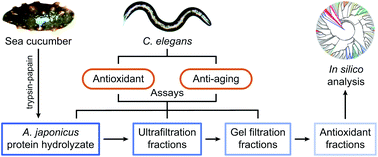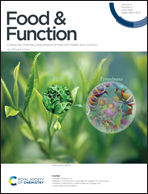Antioxidant and anti-aging effects of a sea cucumber protein hydrolyzate and bioinformatic characterization of its composing peptides
Abstract
Sea cucumbers have been used as food delicacies and traditional medicine for centuries, and their health benefits are partly attributed to their repertoire of proteins. Peptides prepared from the sea cucumber Apostichopus japonicus are reported to have in vitro antioxidant activities. Here, we investigated the in vivo antioxidant capacity of AjPH, a peptide-rich A. japonicus protein hydrolyzate, and found that AjPH is capable of increasing the survival rate and reducing the reactive oxygen species (ROS) level in the animal model Caenorhabditis elegans under increased oxidative stress induced by paraquat. AjPH is also shown to enhance the antioxidant defense system in paraquat-exposed nematodes, including upregulation of superoxide dismutase and catalase activities and reduction of malondialdehyde contents. To explore underpinning antioxidant mechanisms, cellular and chemical assays were used to demonstrate that AjPH not only reduces ROS accumulation in cells but also directly scavenges DPPH free radicals. Further studies indicate that AjPH can decrease age pigments and extend lifespan but does not reduce food intake, body length and brood size of the nematodes, demonstrating its capacity to delay physiological aging. Using activity-guided fractionation by ultrafiltration and gel filtration, we then isolated antioxidant fractions from AjPH and identified the sequences of their composing peptides, which were subjected to in silico analysis for prospective motifs, physicochemical properties and antioxidant potential. Taken together, our results provide an insight into the nutraceutical potential of the sea cucumber protein hydrolyzate for aging and related conditions and also a basis for future mechanistic studies of individual antioxidant peptides.

- This article is part of the themed collection: Food & Function Recent HOT articles


 Please wait while we load your content...
Please wait while we load your content...